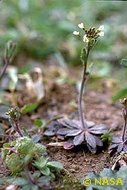Thursday, August 31, 2006
In a technical tour de force, Salk scientists take a global view of the epigenome
 A collaboration between researchers at the Salk Institute for Biological Studies and the University of California at Los Angeles captured the genome-wide DNA methylation pattern of the plant Arabidopsis thaliana - the 'laboratory rat' of the plant world - in one big sweep.
A collaboration between researchers at the Salk Institute for Biological Studies and the University of California at Los Angeles captured the genome-wide DNA methylation pattern of the plant Arabidopsis thaliana - the 'laboratory rat' of the plant world - in one big sweep.
'In a single experiment we recapitulated 20 years worth of anecdotal findings and then some,' says senior author Joseph Ecker, Ph.D., a professor in the Salk Institute's Plant Biology Laboratory. 'Previously, only a hand full of plant genes were known to be regulated by methylation. In addition to those, we found hundreds of others.'
These technological innovations, pioneered by Ecker's team and that of Steve Jacobsen, Ph.D., a Howard Hughes Medical Institute investigator at UCLA, should have broad impact on the analysis of the human genome, stem cell biology and therapeutic cloning. Their findings will appear in a forthcoming issue of Cell.
Our view of heredity has largely been written in the language of DNA, but recent discoveries in a field known as epigenetics - the study of heritable changes in gene function that occur without changing the letters of the DNA alphabet - show that how a cell 'reads' those letters is critical. [epigenome, cells]
--
The Cell paper referred to above, "Genome-wide High-Resolution Mapping and Functional Analysis of DNA Methylation in Arabidopsis", is (currently) open access: Abstract | Full Text | Pdf
technorati tags: arabidopsis, epigenome, salk, institute, university, california, los+angeles, genome, wide, dna, methylation, pattern, plant, biology, genes, laboratory, howard+hughes, medical, investigator, ucla, stem, cell, cloning, cells, heredity, epigenetics
Add to: CiteUlike | Connotea | Del.icio.us | Digg | Furl | Newsvine | Reddit | Yahoo